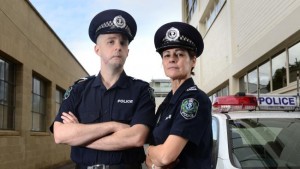SEVERAL thousand police officers, their families and supporters have taken to the streets in a protest march at the provisions affecting them under the State Government’s new workers compensation legislation.
The rare protest — the last march took place in 1991 as part of an acrimonious pay dispute — was aimed at gaining support for a move to restore compensation and medical benefits for officers seriously injured in the line of duty.
The march, led by Police Association president Mark Carroll, his executive and workplace delegates, blocked two lanes of King William St and spread over two city blocks as it converged on Parliament House from Victoria Square.
The march was timed to garner support for an amendment to the Police Act being introduced in the Legislative Council later today by Family First’s Robert Brokenshire.
His amendment would restore benefits for injured police that have been taken away under the new Return to Work Act.
The Opposition and independents in the Upper House are planning to support the Brokenshire amendment, but the Government is opposing it and contending that seriously injured officers are adequately catered for under the Return to Work Act.
During the campaign, four officers have publicly detailed their injuries and described the impact of the new legislation on their financial futures.
The Government has disputed the validity of one officer’s case, but has not challenged the other three. It has stated a review of the new Act that will be undertaken after three years of operation will examine any anomalies or extraordinary cases that become evident.
Police Commissioner Grant Stevens this morning formally advised the association that he did not support the Brokenshire amendment.
In a letter he stated that he supports “the provision of adequate protection for police officers injured in the line of duty’’ but he was satisfied the review provision of the new Act would “enable any identified problems to be objectively considered and remedied in due course’’.
“I would support the introduction of increased protection for police officers injured in the line of duty if that eventually proves necessary, but I am not convinced that the Amendment Bill in its current form or any other form of amendment is required at this stage,’’ he stated.
After the protest Attorney-General John Rau confirmed the Government did not support the move and said the union owed Mr Stevens an apology for suggesting he was not looking after his officers.
Mr Rau did concede, though, that there may be “gaps” in the laws.
He said he’d had “reflective” discussions with other emergency services workers about whether there should be special considerations for people who work in “unsafe, uncontrolled environments”.
“The knee-jerk reaction of the Brokenshire Bill, which would basically mean police are carved out as a special group and were given benefits way beyond what the old or scheme could offer, is quite frankly not OK and we do not support it,” Mr Rau said.
“My concern is that we have a calm, informed and reflective consideration of whether there are indeed gaps in the support provided to these workers across Government who work in unsafe environments where there is no control of the environment.”
Under the new Return to Work Act there are caps on compensation for all injured workers, along with a two-year cap on income maintenance and a three-year cap on medical expenses.
Only workers who exceed a 30 per cent impairment scale will receive any benefits beyond those caps — excluding the vast majority of police injured on duty.
Mr Carroll said he was “disappointed’’ Mr Stevens had decided to follow the “government line’’ on the issue.


